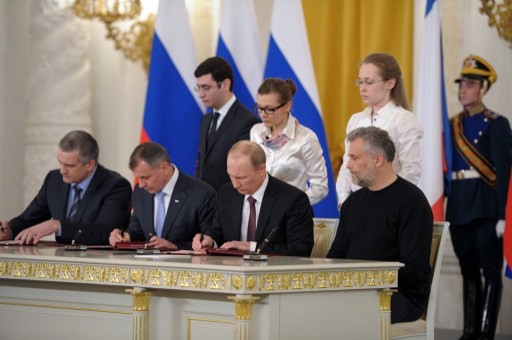Russian authorities mark March 18 as a state holiday in Crimea, as they celebrate three years since Russia formally annexed the peninsula.
Ukraine, as well as the international community, condemns Russia for its violation of international law in occupying Crimea and demands that it stops massive human rights violations and persecution of Crimean Tatars and other pro-Ukrainian citizens.
Human rights organizations have documented at least 279 cases of human rights violations, including kidnappings, searches of offices and apartments, arrests, and criminal cases being brought on bogus charges.
The real number might be much higher, however, as citizens on the peninsula may not be reporting all violations out of fear of retaliation from the Russian occupation authorities. Russia denies the accusations.
Lithuanian President Dalia Grybauskaitė is one of those who believes that Crimea belongs to Ukraine.
“Freedom may be occupied but can never be taken away,” she wrote on her Twitter early on March 18.

Russia’s President Vladimir Putin (2nd R), Crimean Prime Minister Sergei Aksyonov (L), Crimean parliament speaker Vladimir Konstantionov (2nd L) and Alexei Chaly, Sevastopol’s new de facto mayor (R), sign a treaty on the Ukrainian Black Sea peninsula becoming part of Russia in the Kremlin in Moscow on March 18, 2014. Putin pushed today every emotional button of the collective Russian psyche as he justified the incorporation of Crimea, citing everything from ancient history to Russia’s demand for respect to Western double standards. (AFP)
The European Parliament, in its press release, issued on March 16, also condemned Russia’s occupation of Crimea, saying “it deplores violations of freedom of speech, abuse of the media, forced imposition of Russian citizenship and the discriminatory policies imposed by the so-called authorities against, in particular, Crimea’s ethnic Tatar minority.”
The European Parliament also noted that Russia should “release without further delay all illegally and arbitrarily detained Ukrainian citizens, both in Russia and in the temporarily occupied territories of Ukraine, and to provide for their safe return.”
Russia should also “immediately cease the practices of persecution” since many cases have been reported of kidnappings, torture and systematic intimidation of local citizens opposed to the annexation of Crimea, the release states.
U.S. State Department spokesman Mark Toner made this statement on March 16:
“Three years ago, Russia seized and occupied Crimea. Russia then staged an illegitimate referendum in which residents of Crimea were compelled to vote while heavily armed foreign forces occupied their land. The United States does not recognize Russia’s ‘referendum’ of March 16, 2014, nor its attempted annexation of Crimea and continued violation of international law. We once again reaffirm our commitment to Ukraine’s sovereignty and territorial integrity.
“Over the past three years, Russian occupation ‘authorities’ in Crimea have engaged in a campaign to suppress dissent. In Russian-occupied Crimea, human rights monitors have documented enforced disappearances, extrajudicial killings, torture and punitive psychiatric hospitalizations. Crimean Tatars, ethnic Ukrainians, pro-Ukrainian activists, and independent journalists have been subjected to politically motivated prosecution and face ongoing repression. Russian occupation “authorities” have silenced and forced the closure of nongovernmental organizations and independent media and have consistently denied international observers access to the peninsula. We call on Russia to cease its attempts to suppress freedom of expression, peaceful assembly, association, and religion.
“Crimea is a part of Ukraine. The United States again condemns the Russian occupation of Crimea and calls for its immediate end. Our Crimea-related sanctions will remain in place until Russia returns control of the peninsula to Ukraine,” the statement concluded.
Transparency International, an human rights watchdog, also rings alarm bells over the situation on the annexed peninsula. According to the organization’s report, published on March 17, “ the human rights situation in Crimea is worsening fast.”
“It is exacerbated by the absence of any effective international monitoring mechanism with access to the peninsula, which has emboldened the Russian and the de facto authorities in Crimea to persevere in their relentless campaign against all vestiges of dissent,” the report says.
And Amnesty International wrote in its annual report: “In Crimea, the de facto authorities continued their campaign to eliminate pro-Ukrainian dissent. It increasingly relied on Russian anti-extremism and anti-terrorism legislation and criminal prosecution of dozens of people perceived to be disloyal.”
Meanwhile, Ukrainian authorities on March 17 launched the telecommunication tower in Chonhar, a village in Kherson Oblast 700 kilometers southeast from Kyiv and five kilometers from the Crimean peninsula. The tower will allow at least four Ukrainian radio stations to broadcast in Crimea.
